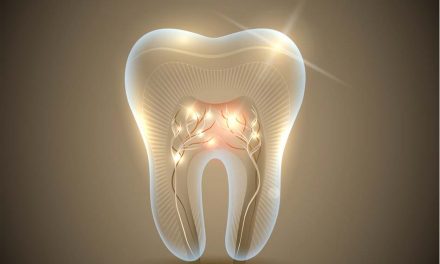Just like a heart attack, an angina attack can be felt like pain that starts in the chest and radiates to the lower jaw.
Patients with stable angina can be treated like any other patients and proceed with any dental treatment. But people who suffer from unstable angina should not receive elective dental procedures and concentrate only on emergency treatments.
It’s recommended to reduce stress during a dental appointment because stress can trigger angina attacks. It is also important to bring angina medications to the dentist’s office. Some ways to reduce stress are sleeping well the night before seeing your dentist and avoiding caffeine before the appointment.
Some drugs such as calcium channel blockers might cause gingival hyperplasia (overgrowth of the gums), which can start as soon as one month after someone starts taking the drug. Some people’s gums become so large they have difficulty eating and surgery is necessary to make the correction. If the dentist detects that problem, the patient must follow detailed hygiene instructions and have more frequent cleanings.
The information above should be used as a reference only. Any medical decision should not be taken before consulting a health care professional.
The masculine gender may have been more used in the article, but without prejudice, to make reading easier.
Category: questions and answers
- Are dental x-rays safe for pregnant women?
- Are teeth alive?
- At what age do children’s teeth start coming out?
- Can an abscess cause a tooth to break apart?
- Can dry mouth be harmful?
- Can heart disease be related to dental care?
- Can teeth grinding affect children?
- Can wisdom teeth move other teeth?
- Can you drink alcohol after tooth extraction?
- Do you have to remove retainers or orthodontic appliances when you eat?
- Does chewing gum after a meal help eliminating dental plaque?
- Does chewing gum eliminate bad breath?
- For which sports should you use a mouthguard?
- How can smokers take care of their oral health?
- How can you get rid of a tooth abscess?
- How can you get rid of an ulcer or a canker sore on your tongue?
- How can you prevent a tooth abscess?
- How can you reduce the effects of dry mouth?
- How can you tell if you have a tooth abscess?
- How can you tell that you are grinding your teeth?
- How can you tell that you have dry mouth?
- How can you treat a tooth abscess?
- How can you treat dry mouth?
- How can you treat teeth grinding?
- How does smoking affect oral health?
- How does smoking affect overall health?
- How is infective endocarditis related to oral health?
- How long does it bleed after wisdom teeth extraction?
- How long does the numbing last after a dentist appointment?
- How many teeth are there in the mouth?
- How soon after tooth extraction can you use a straw?
- How thin are dental veneers?
- Is a root canal painful?
- Is amalgam in teeth (grey fillings) bad for your health?
- Is it necessary to place a dental crown on a tooth that had a root canal?
- Is it normal for gums to bleed when you brush your teeth?
- Is it painful to place a dental implant in your mouth?
- Is smoking bad for your teeth?
- Is there a relationship between dental problems and overall health problems?
- Should people that had a heart attack take precautions when undergoing dental treatments?
- Should people that have a pacemaker take special precautions with their dental care?
- Should people that have had coronary artery bypass surgery take special precautions with their dental care?
- Should people that suffer from congestive heart failure take special precautions with their dental care?
- Should people with angina take precautions when undergoing dental treatments?
- Should people with high blood pressure take precautions when undergoing dental treatments?
- What are the advantages of silver fillings?
- What are the symptoms of having a tooth abscess?
- What can you eat after wisdom teeth extraction?
- What diseases might cause you to have dry mouth?
- What lasts longer, grey or white fillings?
- What may happen if you don’t treat a cavity?
- What might cause you to grind your teeth?
- What might happen if you don’t treat a tooth abscess?
- When can you eat and drink after a tooth filling?
- When can you play sports after wisdom teeth surgery?
- When can you smoke after a tooth extraction?
- When do dissolvable stitches fall out after wisdom teeth extraction?
- Where does a tooth go after extraction?
- Which is better retainers or braces?
- Why are wisdom teeth called “wisdom teeth”?
- Why is teeth-grinding bad for you?
- Why you should not smoke after tooth extraction?
- Will taking antibiotics make the colour of your teeth darker?





